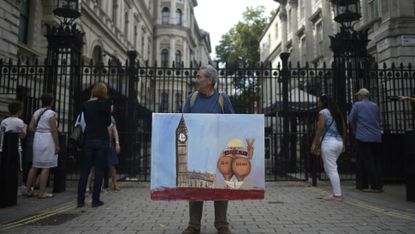What is the prorogation of parliament?
Supreme Court says Boris Johnson’s decision to suspend Parliament was ‘unlawful’

Boris Johnson’s controversial prorogation of Parliament has been ruled “unlawful” by the Supreme Court.
The panel of 11 justices was unanimous in the decision, after listening to evidence on the legality of the prime minister’s advice to the Queen to suspend the House of Commons for five weeks.
They heard historic appeals that arose out of separate legal challenges in England and Scotland, which produced differing outcomes.
Subscribe to The Week
Escape your echo chamber. Get the facts behind the news, plus analysis from multiple perspectives.

Sign up for The Week's Free Newsletters
From our morning news briefing to a weekly Good News Newsletter, get the best of The Week delivered directly to your inbox.
From our morning news briefing to a weekly Good News Newsletter, get the best of The Week delivered directly to your inbox.
Johnson’s opponents argued that it was an “unlawful abuse of power” aimed at silencing MPs, while his lawyers tried to claim that the Supreme Court had no jurisdiction to rule on the length of prorogation.
Speaker John Bercow has said the House of Commons will resume at 11.30am on Wednesday.
So what is proroguing?
Prorogation is the formal term for the end of a parliamentary session and is marked with a ceremony in the House of Lords. It normally entails an announcement and speech on behalf of the Queen.
–––––––––––––––––––––––––––––––Sign up for our free Countdown to Brexit newsletter, a weekly guide to the gravity and absurdity of British politics–––––––––––––––––––––––––––––––
According to Parliament.uk, once the Commons has been prorogued, all motions that have not been answered, or Bills that have not obtained Royal Assent, will not progress any further. Neither House can meet, debate and pass legislation.
A Bill can, however, be reintroduced in the next session by an MP or continue in the next session if a carry-over motion has been passed.
While prorogation is a normal process, the length of suspension in this case - from 9 September to 14 October - was deemed unusually long. Opponents feared the government was sending MPs away to stop them blocking the UK’s exit from the EU with or without a deal.
Johnson’s prorogation “does seem like a very obvious move to cut down the time available for anti-no-deal MPs to do something about it”, the Institute for Government’s Catherine Haddon told the BBC.
iNews adds that, “historically, this method has been used by monarchs to stop Parliament from interfering with their plans”.
–––––––––––––––––––––––––––––––For more political analysis - and a concise, refreshing and balanced take on the week’s news agenda - try The Week magazine. Get your first six issues free–––––––––––––––––––––––––––––––
What is the difference between prorogation and dissolution?
While proroguing happens at the end of every session, dissolution only occurs before an election.
Under the Fixed-term Parliaments Act, Parliament is dissolved 25 days before an election - but prorogation can predate that, and kill all the House’s business while Parliament technically still exists.
The BBC notes that the latest session had been going for two years - since the 2017 election - “as it was extended to tackle the legislation for Brexit”.
Prorogation is also different from a “recess”, when the House does not sit but parliamentary business can otherwise continue as usual.
Is there a precedent for this?
This sort of thing “makes officials rather nervous”, says Politico, although Theresa May’s former legislative adviser Nikki da Costa notes it has been done before.
Writing for The Daily Telegraph, she says: “This is not to be done lightly, but there is historical precedent. In 1948 a new Parliament Bill to reduce the power of the Lords was being blocked by peers, but powers… which would allow the government to override the Lords could only be used if there had been a delay over three ‘sessions’. A special short session of 10 days was therefore arranged.”
Reacting to Johnson’s plan to ask the Queen to suspend Parliament, Conservative Party Chairman James Cleverly defended the plan as something “all new governments do”.
Could the Queen have refused?
The Queen technically has the power to refuse the Government’s request to suspend Parliament, but constitutionally a refusal is impossible.
Under the British Parliamentary democracy, the Queen acts on the advice of her prime minister.
That means that decisions over when Parliament sits are decided by the Government, and only rubber-stamped by Buckingham Palace.
What did the Supreme Court rule?
Today, the Supreme Court justices said: “The decision to advise Her Majesty to prorogue was unlawful because it had the effect of frustrating or preventing the ability of parliament to carry out its constitutional functions.”
Therefore the prorogation is “void and of no effect”, meaning Parliament has not been suspended.
Over the weekend, Foreign Secretary Dominic Raab told the BBC’s Andrew Marr Show: “Of course we will respect whatever the legal ruling is from the Supreme Court.”
He added that there may be “different permutations as to what the Supreme Court may or may not decide” and that “later in the week we’ll obviously want to look at that very carefully”.
But today’s ruling was very clear.
“We expected constitutional history leading to legal and political tremors - we got an earthquake,” says Sky News home editor Jason Farrell. “The government has lost on all levels.”
Create an account with the same email registered to your subscription to unlock access.
Sign up for Today's Best Articles in your inbox
A free daily email with the biggest news stories of the day – and the best features from TheWeek.com
-
 The hunt for Planet Nine
The hunt for Planet NineUnder The Radar Researchers seeking the elusive Earth-like planet beyond Neptune are narrowing down their search
By Chas Newkey-Burden, The Week UK Published
-
 Magazine interactive crossword - April 26, 2024
Magazine interactive crossword - April 26, 2024Puzzles and Quizzes Issue - April 26, 2024
By The Week US Published
-
 Magazine solutions - April 26, 2024
Magazine solutions - April 26, 2024Puzzles and Quizzes Issue - April 26, 2024
By The Week US Published
-
 Is David Cameron overshadowing Rishi Sunak?
Is David Cameron overshadowing Rishi Sunak?Talking Point Current PM faces 'thorny dilemma' as predecessor enjoys return to world stage
By The Week UK Published
-
 Will Aukus pact survive a second Trump presidency?
Will Aukus pact survive a second Trump presidency?Today's Big Question US, UK and Australia seek to expand 'game-changer' defence partnership ahead of Republican's possible return to White House
By Sorcha Bradley, The Week UK Published
-
 Farewell to Theresa May: a PM consumed by Brexit
Farewell to Theresa May: a PM consumed by BrexitTalking Point Maidenhead MP standing down at next general election
By The Week UK Published
-
 Can Boris Johnson save Rishi Sunak?
Can Boris Johnson save Rishi Sunak?Today's Big Question Former PM could 'make the difference' between losing the next election and annihilation
By The Week UK Published
-
 It's the economy, Sunak: has 'Rishession' halted Tory fightback?
It's the economy, Sunak: has 'Rishession' halted Tory fightback?Today's Big Question PM's pledge to deliver economic growth is 'in tatters' as stagnation and falling living standards threaten Tory election wipeout
By Harriet Marsden, The Week UK Published
-
 Stormont power-sharing in sight: 'good news' for Northern Ireland?
Stormont power-sharing in sight: 'good news' for Northern Ireland?Talking Point Unionists vote to end two-year boycott after agreeing legislative package to address post-Brexit trading arrangements
By The Week UK Published
-
 Why your local council may be going bust
Why your local council may be going bustThe Explainer Across England, local councils are suffering from grave financial problems
By The Week UK Published
-
 Rishi Sunak and the right-wing press: heading for divorce?
Rishi Sunak and the right-wing press: heading for divorce?Talking Point The Telegraph launches 'assault' on PM just as many Tory MPs are contemplating losing their seats
By Keumars Afifi-Sabet, The Week UK Published